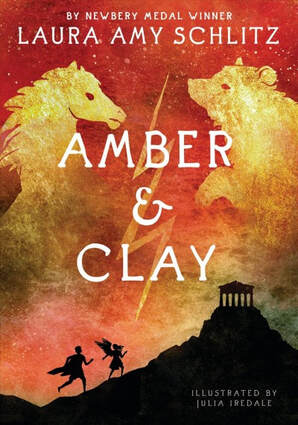
Rhaskos. A Thracian slave, worth far less than the animals he cares for. Separated from his mother, forced to serve a master who curses him and beats him. He draws horses in the dirt, and dreams of freedom.
Melisto. She caused her mother no end of trouble as a baby. She has never stopped. The future looks as bleak to her as a stretch of flawless fabric: what everyone expects, and so easily ignored. Serving Artemis as a Little Bear might be the first and last chance, however temporary, for her to be herself.
Against the backdrop of ancient Greece, told in poetry and prose and in fragments of the past, this is the tale of a boy and a girl whose futures are dark to them—and who might, through the impossible friendship they form, at last find the peace they have both been searching for.
Amber & Clay is unique and utterly absorbing, blending historical fiction, magic, and archaeology into something almost improbably powerful and beautiful. I’ve read a handful of books which use both prose and poetry, and honestly none of them have pulled it off very well; there always feels as though there is an abrupt shift when transitioning from one to another. But Schlitz’s prose is so lyrical and deliberate that the story flowed seamlessly from one style to another, and brought the book together more fully and made it feel more concrete rather than splintering it into sections. Not only that, but this ranks among one of the most excellent historical novels I have read (it’s set in Greece, particularly the Athens area, around the fifth century BCE)—not just for how it feels as though it stays utterly true to the time period, but because the feelings and conflicts and dreams of Rhaskos and Melisto are so bright and evocative in my mind that they might be living next door, not twenty-six centuries ago.
To be honest, of all the books I’ve reviewed, Amber & Clay is one of the hardest to describe. Its scope feels enormous, and yet deeply personal; its struggles, concrete and yet ephemeral. So much happens, but it isn’t the tale of the vast shifts of war and politics occurring in the background. It isn’t even a grandiose interpretation of what it must’ve been like, growing up without any chance at having rights. Instead of seeking to change the world, Rhaskos and Melisto both simply seek to live with it: to live in a society which they see not as unjust and discriminatory as we do now, but simply as how the world is. This crucial and too-unique nuance lends the story a vibrant realism which it might otherwise lack, and helps every detail of the story, its characters, and its setting shine with power and truth. Amber & Clay is, quite simply, extraordinary—I highly recommend it to readers ages eleven and up.



 RSS Feed
RSS Feed
